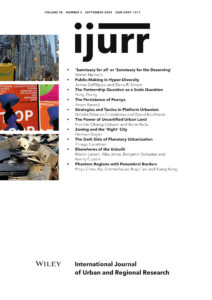Transformation of regional identities by administrative spatial restructurings has been relatively little studied, particularly in the context of regional deinstitutionalization. This article develops further a theoretical and conceptual framework of regional identities in spatial restructurings by discussing how deinstitutionalized ‘phantom’ regions with ‘penumbral’ borders beget more hybrid spatial identities. Empirically, the focus is on the Huizhou region in China: we study the changes in regional identity generated by several spatial de- and reconstruction processes. Underlining hybridity, we show that, although regional identity is shifting away from territorial belonging to Huizhou in some parts of the region (e.g. Wuyuan County), cultural identification with the Huizhou region remains strong even after a long period of administrative separation. Relatedly, we point out that deinstitutionalization in the Huizhou region has not been exhaustive and its regional identity is being increasingly reconstructed in a utilitarian manner for economic purposes. Despite (and partly because of) this, a sense of regional belonging has been maintained. Regional identities associated with Huizhou are relational and, more precisely, hybrid, as they are connected to regions that are neither fully institutionalized nor deinstitutionalized but appear as multilayered palimpsests that are being transformed through processes of constant making and remaking.
Details
Written by:
Pinyu Chen, Kaj Zimmerbauer, Ruyu Tao, Xiang Kong
Digital Object Identifier (DOI)
https://doi.org/10.1111/1468-2427.13271
About DOI

